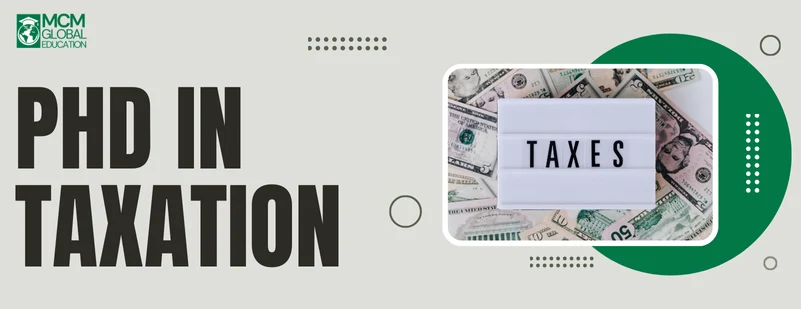Taxes are the backbone of every modern economy, shaping government revenues, business strategies, and individual financial planning. For those passionate about understanding taxation at its deepest level, a PhD in Taxation is the ultimate academic and professional pursuit.
This doctoral degree is designed for scholars and professionals who want to advance knowledge in tax law, international taxation, tax policy, accounting, and financial systems. Graduates often pursue careers in academia, government, consulting, or corporate leadership, where they influence fiscal policy and global taxation strategies.
This blog covers everything you need to know about a PhD in Taxation, from eligibility and curriculum to universities, career options, salaries, and future scope.
Table of Contents
What is a PhD in Taxation?
A PhD in Taxation is a doctoral-level program focusing on advanced research in tax systems, tax law, and financial policy. It equips students with the ability to:
- Conduct in-depth research on domestic and international taxation issues.
- Contribute to academic literature and policy debates.
- Teach taxation, law, or accounting at the university level.
- Advise governments, corporations, and international organizations on fiscal matters.
Depending on the university, this degree may be offered as a PhD in Taxation, PhD in Accounting with a specialization in Tax, or as part of a Doctor of Business Administration (DBA) in Taxation.
Why Pursue a PhD in Taxation?
A PhD in Taxation opens up several high-level opportunities:
| Reason | Benefit |
|---|---|
| Academic Career | Become a professor or researcher in taxation, law, and accounting. |
| Policy Leadership | Shape tax policy at national and international levels. |
| Consultancy | Work with corporations, governments, and NGOs on tax strategy. |
| Corporate Roles | Lead taxation and compliance divisions in global companies. |
| Research Impact | Publish cutting-edge research influencing tax law and business practices. |
Eligibility Criteria for PhD in Taxation
Admission requirements vary by institution, but typically include:
Educational Qualification
- Master’s degree in taxation, accounting, finance, law, or economics.
- Exceptional candidates with only a bachelor’s degree may be considered at some universities.
Academic Performance
- GPA: 3.0–3.5 on a 4.0 scale.
- Strong background in mathematics, economics, and law is preferred.
Entrance Exams
- GRE/GMAT scores (common in U.S. universities).
- TOEFL/IELTS for international applicants.
Other Requirements
- Letters of recommendation.
- Statement of purpose.
- Research proposal (taxation-related).
- Professional experience in accounting, law, or finance is a plus.
Duration of PhD in Taxation
| Mode of Study | Average Duration |
|---|---|
| Full-Time | 4–6 years |
| Part-Time | 6–8 years |
| Online/Hybrid (limited availability) | 4–6 years |
The timeline depends on coursework, research complexity, and dissertation completion.
Curriculum of PhD in Taxation
The PhD in Taxation curriculum combines advanced coursework, research methodology, and dissertation writing.
Core Coursework
- Advanced Tax Theory
- International Taxation
- Tax Law & Policy
- Transfer Pricing & Global Tax Compliance
- Corporate Taxation & Business Strategy
- Public Finance & Government Tax Systems
- Research Methodology & Econometrics
- Accounting Theory & Practice
Program Structure
| Year | Focus Area |
|---|---|
| Year 1 | Core courses in taxation, accounting, and research methodology |
| Year 2 | Electives + comprehensive examinations |
| Year 3 | Research proposal, fieldwork, data collection |
| Year 4–6 | Dissertation research, writing, and defense |
Specializations in PhD in Taxation
PhD students may choose research specializations such as:
| Specialization | Focus Area |
|---|---|
| International Taxation | Tax treaties, cross-border taxation, multinational firms |
| Corporate Taxation | Business tax planning, compliance, corporate governance |
| Transfer Pricing | Pricing rules for global supply chains and subsidiaries |
| Public Finance & Tax Policy | Taxation and government expenditure systems |
| Tax Law & Legal Systems | Comparative tax laws, fiscal legal frameworks |
| Behavioral Taxation | Taxpayer psychology, compliance behavior |
| Digital Economy Taxation | E-commerce, cryptocurrency, and digital tax laws |
| Environmental & Green Taxation | Carbon tax, sustainability, and environmental policy |
Top Universities Offering PhD in Taxation
Globally, only a few institutions offer specialized PhD in Taxation programs, but many universities provide a PhD in Accounting, Law, or Economics with taxation as a concentration.
| University | Country | Program |
|---|---|---|
| University of Texas at Austin (McCombs School of Business) | USA | PhD in Accounting with Taxation specialization |
| New York University (NYU) – Stern School of Business | USA | PhD in Accounting/Taxation |
| University of Illinois Urbana-Champaign | USA | PhD in Accountancy with Tax focus |
| London School of Economics (LSE) | UK | PhD in Accounting & Tax Policy |
| University of Melbourne | Australia | PhD in Taxation & Business Law |
| University of Amsterdam | Netherlands | PhD in International Tax Law |
| National University of Singapore | Singapore | PhD in Accounting/Finance with Tax research |
Career Opportunities After PhD in Taxation
Graduates of a PhD in Taxation enjoy career opportunities in academia, government, corporate leadership, and consulting.
Academic Careers
- Professor of Taxation, Accounting, or Law.
- University researcher and author of scholarly publications.
- Tax policy advisor for academic think tanks.
Corporate Careers
- Head of Tax / Chief Tax Officer.
- Corporate Tax Advisor in multinational companies.
- Director of Global Tax Compliance.
Consultancy & Advisory
- Tax Consultant for Big Four firms (PwC, Deloitte, EY, KPMG).
- Independent tax advisor.
- Transfer pricing specialist.
Government & International Careers
- Tax Policy Analyst for government agencies.
- Fiscal policy advisor for the OECD, World Bank, or IMF.
- Legal advisor on international tax treaties.
Salary After PhD in Taxation
Salaries for PhD in Taxation graduates are among the highest in academia and corporate consulting.
| Career Path | Average Annual Salary (USD) |
|---|---|
| University Professor (Taxation/Accounting) | $90,000 – $150,000 |
| Corporate Tax Director | $120,000 – $220,000 |
| Senior Tax Consultant (Big Four Firms) | $100,000 – $180,000 |
| International Tax Advisor | $110,000 – $200,000 |
| Government / Policy Analyst | $85,000 – $140,000 |
Benefits of PhD in Taxation
- Professional Credibility – Recognition as a global taxation expert.
- High Salary Potential – Six-figure earnings in academia, consulting, and corporate roles.
- Diverse Career Paths – Opportunities across academia, industry, and policy-making.
- Research Contribution – Influence taxation laws and policies globally.
- Global Relevance – Taxation expertise is valued worldwide.
Challenges of Pursuing a PhD in Taxation
- Time Commitment – 4–6 years of intensive study and research.
- Financial Costs – High tuition fees, though many programs offer stipends.
- Research Pressure – Requirement to publish in peer-reviewed journals.
- Complexity of Subject – Requires mastery of law, finance, economics, and accounting.
Skills Required for PhD in Taxation
| Technical Skills | Soft Skills |
|---|---|
| Tax Law & Policy Analysis | Analytical Thinking |
| Accounting & Financial Management | Problem-Solving |
| Econometrics & Data Analysis | Leadership |
| International Tax Systems | Communication |
| Research & Academic Writing | Strategic Decision-Making |
Future Scope of PhD in Taxation
The future of taxation is evolving with globalization, digital transformation, and sustainability initiatives.
Key Opportunities Ahead
- Digital Taxation – Addressing cryptocurrency, e-commerce, and digital platforms.
- Sustainable Tax Policy – Green taxes and carbon tax policies.
- Global Tax Reforms – OECD and G20-led international tax restructuring.
- AI & Tax Technology – Using automation and AI in tax compliance.
- International Organizations – Rising demand for tax specialists in IMF, OECD, and UN.
FAQs on PhD in Taxation
Q1. Is a PhD in Taxation worth it?
Yes, it opens up high-paying roles in academia, government, and multinational corporations.
Q2. Can I do a PhD in Taxation online?
Few universities offer online or hybrid DBA programs with a tax specialization, but most PhDs are campus-based.
Q3. Do I need a master’s degree in taxation to apply?
A master’s in taxation, law, accounting, or finance is usually required.
Conclusion
A PhD in Taxation is a prestigious and highly rewarding program for those passionate about tax systems, law, and financial policy. It offers academic prestige, lucrative salaries, and global career opportunities in academia, corporate leadership, consulting, and government policy.
If you aim to become a taxation scholar, corporate leader, or international tax advisor, pursuing a PhD in Taxation equips you with the expertise, credibility, and influence to make a significant impact in the world of finance and law.























